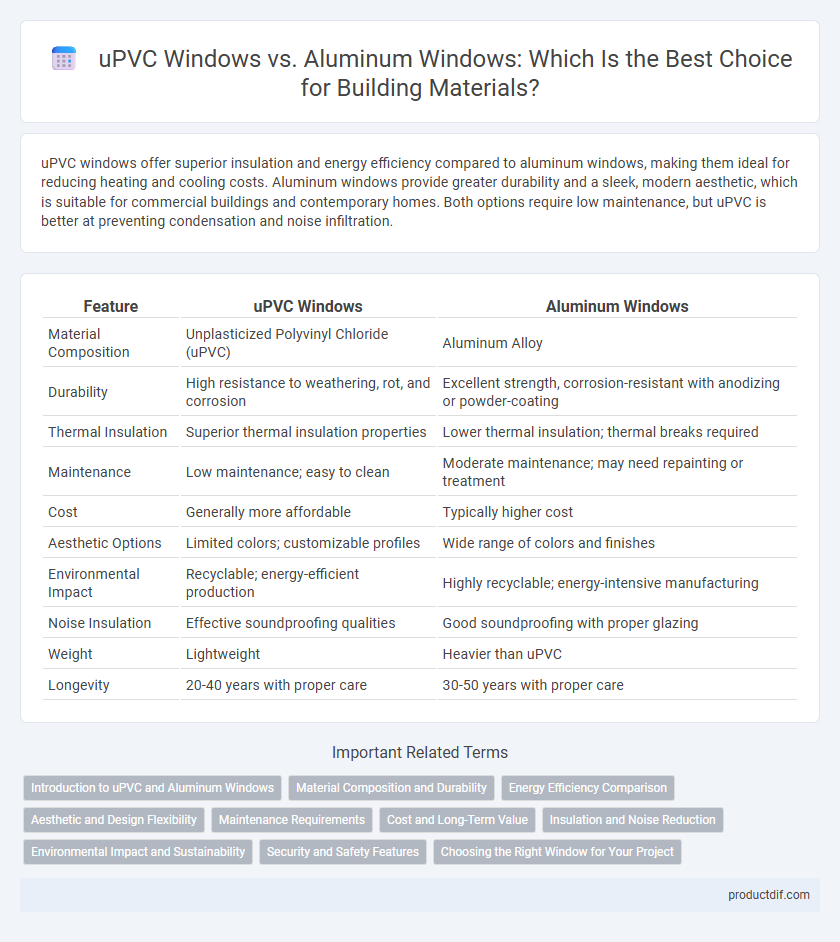uPVC windows offer superior insulation and energy efficiency compared to aluminum windows, making them ideal for reducing heating and cooling costs. Aluminum windows provide greater durability and a sleek, modern aesthetic, which is suitable for commercial buildings and contemporary homes. Both options require low maintenance, but uPVC is better at preventing condensation and noise infiltration.
Table of Comparison
| Feature | uPVC Windows | Aluminum Windows |
|---|---|---|
| Material Composition | Unplasticized Polyvinyl Chloride (uPVC) | Aluminum Alloy |
| Durability | High resistance to weathering, rot, and corrosion | Excellent strength, corrosion-resistant with anodizing or powder-coating |
| Thermal Insulation | Superior thermal insulation properties | Lower thermal insulation; thermal breaks required |
| Maintenance | Low maintenance; easy to clean | Moderate maintenance; may need repainting or treatment |
| Cost | Generally more affordable | Typically higher cost |
| Aesthetic Options | Limited colors; customizable profiles | Wide range of colors and finishes |
| Environmental Impact | Recyclable; energy-efficient production | Highly recyclable; energy-intensive manufacturing |
| Noise Insulation | Effective soundproofing qualities | Good soundproofing with proper glazing |
| Weight | Lightweight | Heavier than uPVC |
| Longevity | 20-40 years with proper care | 30-50 years with proper care |
Introduction to uPVC and Aluminum Windows
uPVC windows offer excellent thermal insulation, low maintenance, and resistance to corrosion, making them ideal for energy-efficient building designs. Aluminum windows provide superior strength, durability, and sleek modern aesthetics, suitable for large window frames and commercial construction. Choosing between uPVC and aluminum depends on factors like climate, budget, and desired architectural style.
Material Composition and Durability
uPVC windows are constructed from unplasticized polyvinyl chloride, which offers excellent resistance to moisture, corrosion, and UV rays, making them highly durable in various weather conditions. Aluminum windows consist of lightweight metal alloy, providing superior strength and resistance to warping, but they may require thermal breaks to improve insulation and prevent condensation. Both materials exhibit long-lasting performance, but uPVC excels in low maintenance and aluminum in structural robustness and design versatility.
Energy Efficiency Comparison
uPVC windows demonstrate superior energy efficiency compared to aluminum windows due to their low thermal conductivity, which minimizes heat transfer and enhances insulation. Advanced multi-chambered uPVC frames significantly reduce energy loss, contributing to lower heating and cooling costs. Aluminum windows, even with thermal breaks, typically exhibit higher heat conductivity, making uPVC the preferred choice for maximizing energy conservation in buildings.
Aesthetic and Design Flexibility
uPVC windows offer a variety of color options and finishes, enabling customization that complements diverse architectural styles while providing a smooth, clean aesthetic. Aluminum windows excel in slim profiles and sleek lines, allowing for larger glass surfaces and modern, minimalist designs that maximize natural light. The design flexibility of aluminum supports complex shapes and frameless configurations, whereas uPVC prioritizes traditional window styles with reliable durability.
Maintenance Requirements
uPVC windows require minimal maintenance due to their resistance to rot, corrosion, and fading, needing only occasional cleaning with soap and water to maintain their appearance and functionality. Aluminum windows demand more upkeep, including regular cleaning to prevent oxidation and periodic repainting or anodizing to protect against rust and weathering. The durability of uPVC reduces long-term maintenance costs compared to aluminum, which is more vulnerable to environmental wear and requires consistent protective measures.
Cost and Long-Term Value
uPVC windows generally offer lower initial installation costs compared to aluminum windows, making them a budget-friendly option for homeowners. While aluminum windows tend to have higher upfront prices, their exceptional durability and resistance to corrosion contribute to better long-term value through reduced maintenance and longer lifespan. Evaluating both cost and longevity, aluminum windows often provide a higher return on investment despite the initial expense.
Insulation and Noise Reduction
uPVC windows provide superior insulation due to their multi-chamber profiles that trap air, significantly reducing heat transfer compared to aluminum windows, which conduct temperature more readily. The inherent design of uPVC frames also enhances noise reduction by creating an effective barrier against external sound, whereas aluminum windows require thermal breaks and additional sealing to improve acoustic performance. Consequently, uPVC windows are preferred in energy-efficient and noise-sensitive environments for their better insulation and soundproofing qualities.
Environmental Impact and Sustainability
uPVC windows offer superior energy efficiency due to their excellent thermal insulation properties, reducing heating and cooling demands and lowering carbon footprints. Aluminum windows are highly durable and recyclable, with up to 95% of aluminum materials being reused, minimizing landfill waste. The production of uPVC involves less energy consumption compared to aluminum, but aluminum's longer lifespan and recyclability contribute significantly to its sustainability profile.
Security and Safety Features
uPVC windows offer enhanced security with multi-point locking systems and thicker frames that resist forced entry, while aluminum windows provide robust strength due to their metal construction, often equipped with reinforced locks and impact-resistant glass options. The thermal expansion properties of uPVC reduce frame warping, maintaining the integrity of locks over time, whereas aluminum frames require thermal breaks to prevent condensation and maintain safety. Both materials allow for the installation of laminated or toughened glass to improve impact resistance and burglary protection, but uPVC's inherent insulation properties contribute to overall safer and more secure home environments.
Choosing the Right Window for Your Project
uPVC windows offer excellent thermal insulation, low maintenance, and cost-effectiveness, making them ideal for residential projects prioritizing energy efficiency and budget. Aluminum windows provide superior strength, durability, and sleek modern aesthetics, suitable for commercial buildings or designs requiring large, slim frames. Selecting the right window depends on project requirements such as insulation needs, budget constraints, and architectural style preferences.
uPVC windows vs Aluminum windows Infographic

 productdif.com
productdif.com